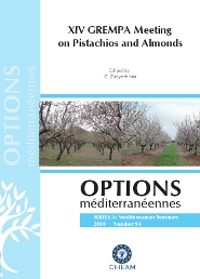| Article précédent | p. 111-115 | Article suivant |
An elite self-compatible selection from the Zaragoza breeding programme
The almond (Prunus amygdalus Batsch) breeding programme at the CITA de Aragón aims at the development of self-compatible cultivars in order to avoid all the problems related to cross-pollination, blooming if possible when the risks of late frosts are over. Previous releases have shown commercial levels of fruit set in growing conditions of single-cultivar orchards, but incidence of late frosts is still damaging in particular years the crop in some inland growing regions. Selection G-2-25, coming from the cross Felisia × Bertina, shows very good traits for a commercial cultivar, blooming in addition two weeks later than Felisia, the latest blooming cultivar released so far. It is thus considered for registration because of its erect growth habit, early ripening, high and regular bloom density, autogamy (S6Sf genotype), high fruit set, tolerance to diseases and drought, hard shell, large kernel, very high content of oleic acid and medium content of tocopherol.
Le programme d'amélioration génétique de l'amandier (Prunus amygdalus Batsch) du CITA d'Aragon a comme but principal l'obtention de cultivars auto-compatibles avec l'objectif d'éviter tous les problèmes relatifs à la pollinisation croisée, avec une floraison aussi tardive que possible, quand les risques de gelées sont moindres. Les obtentions antérieures ont montré des niveaux commerciaux de nouaison dans des conditions de culture en vergers d'un seul cultivar, mais l'incidence de gelées tardives est encore dommageable lors d'années particulières en régions intérieures. La sélection G-2-25, provenant du croisement Felisia × Bertina, montre de très bonnes caractéristiques pour devenir un cultivar commercial, avec en plus une floraison qui se situe deux semaines après Felisia, le cultivar à floraison la plus tardive obtenu jusqu'à présent. Cette sélection est par conséquent envisagée pour être enregistrée en raison d'une croissance à port érigé, maturation précoce, densité florale forte et régulière, autogamie (génotype S6Sf ), forte nouaison, tolérance aux maladies et à la sécheresse, coque dure, grand amandon, contenu très élevé en acide oléique et contenu moyen en tocophérol.
- [ Afficher ]
- [ Télécharger ]
- [ Exporter la citation ]
Vous pouvez télécharger la citation au format :
- [ Imprimer ]
-
Mots-clés
AMELIORATION GENETIQUE, AUTOCOMPATIBILITE, FLORAISON, FRUIT, PRODUCTIVITE, PRUNUS DULCIS, QUALITECiter cet article
Socias i Company R., Kodad O., Alonso J.M., Felipe A.J. An elite self-compatible selection from the Zaragoza breeding programme. In : Zakynthinos G. (ed.). XIV GREMPA Meeting on Pistachios and Almonds. Zaragoza : CIHEAM / FAO / AUA / TEI Kalamatas / NAGREF, 2010. p. 111-115. (Options Méditerranéennes : Série A. Séminaires Méditerranéens; n. 94). 14. GREMPA Meeting on Pistachios and Almonds, 2008/03/30-2008/04/04, Athens (Greece). http://om.ciheam.org/om/pdf/a94/00801292.pdf



